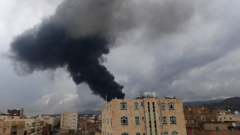**Following a series of Israeli strikes, Iran's government is launching a systematic hunt for supposed infiltrators, intensifying scrutiny on civilians and dissenters alike.**
**Iran's Intensified Crackdown: Seeking Infiltrators Post-Israeli Attacks**

**Iran's Intensified Crackdown: Seeking Infiltrators Post-Israeli Attacks**
**Iranian leadership is instigating a broad campaign against suspected spies, raising concerns over political repression.**
Iran is experiencing a wave of unrest and paranoia following Israeli military actions against its nuclear facilities, prompting authorities to embark on a nationwide hunt for spies and potential infiltrators. In this unsettling climate, the Iranian government is mobilizing the public to act as informants, urging them to report on individuals exhibiting unusual behaviors, such as wearing hats or sunglasses at night, both of which are atypical in the conservative nation.
Reports indicate that Iranian officials are particularly attentive to identifying vehicles with stolen license plates and certain types of trucks or vans that might be a cover for nefarious activities. This community-driven surveillance comes amidst an unprecedented wave of arrests; thousands have been detained under accusations of espionage, and processes for trials are being expedited. The Iranian government is also advancing legislative measures to expand the death penalty for espionage convictions, further adding to the worry within its populace.
The rationale behind such drastic measures is underscored by Iran's history with Israeli intelligence operations, which have demonstrated the ability to penetrate deep into Iranian soil to carry out targeted strikes and intelligence gathering. In light of these recent military advancements from Israel, Iranian officials, possibly driven by paranoia, appear to be reacting with fierce repression against any perceived political opposition.
"Hadi Ghaemi, director of the Center for Human Rights in Iran, emphasized that the current regime seems to be responding to the threats with the ferocity of a cornered animal," indicating that this state of heightened alertness could lead to a more significant suppression of dissent among its citizens. As the situation evolves, many fear that it may spiral into a more extensive crackdown on political opposition and ethnic minorities within Iran.
Reports indicate that Iranian officials are particularly attentive to identifying vehicles with stolen license plates and certain types of trucks or vans that might be a cover for nefarious activities. This community-driven surveillance comes amidst an unprecedented wave of arrests; thousands have been detained under accusations of espionage, and processes for trials are being expedited. The Iranian government is also advancing legislative measures to expand the death penalty for espionage convictions, further adding to the worry within its populace.
The rationale behind such drastic measures is underscored by Iran's history with Israeli intelligence operations, which have demonstrated the ability to penetrate deep into Iranian soil to carry out targeted strikes and intelligence gathering. In light of these recent military advancements from Israel, Iranian officials, possibly driven by paranoia, appear to be reacting with fierce repression against any perceived political opposition.
"Hadi Ghaemi, director of the Center for Human Rights in Iran, emphasized that the current regime seems to be responding to the threats with the ferocity of a cornered animal," indicating that this state of heightened alertness could lead to a more significant suppression of dissent among its citizens. As the situation evolves, many fear that it may spiral into a more extensive crackdown on political opposition and ethnic minorities within Iran.
















